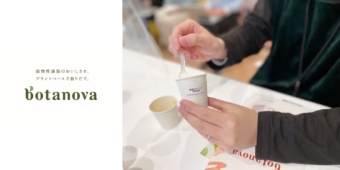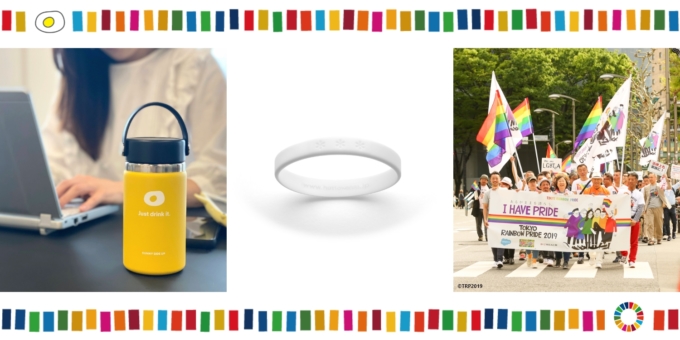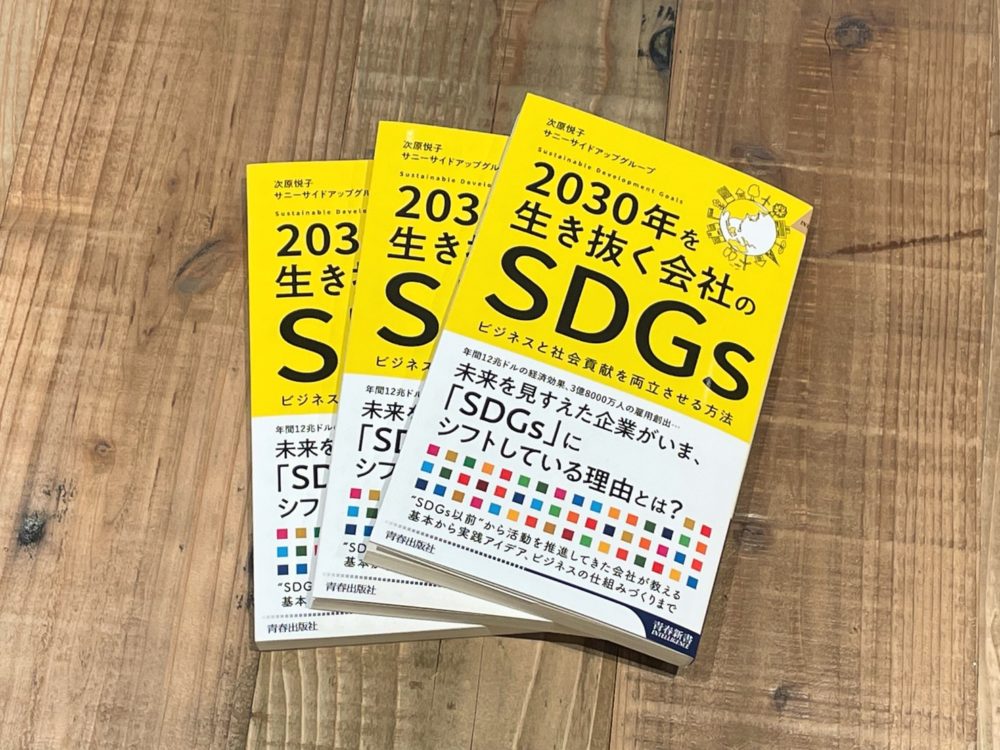Survey PR to Reveal Changes in Attitudes after Tokyo 2020! – The Nippon Foundation Conducts Awareness Survey on Diversity and Inclusion|SDGs Series Part 1
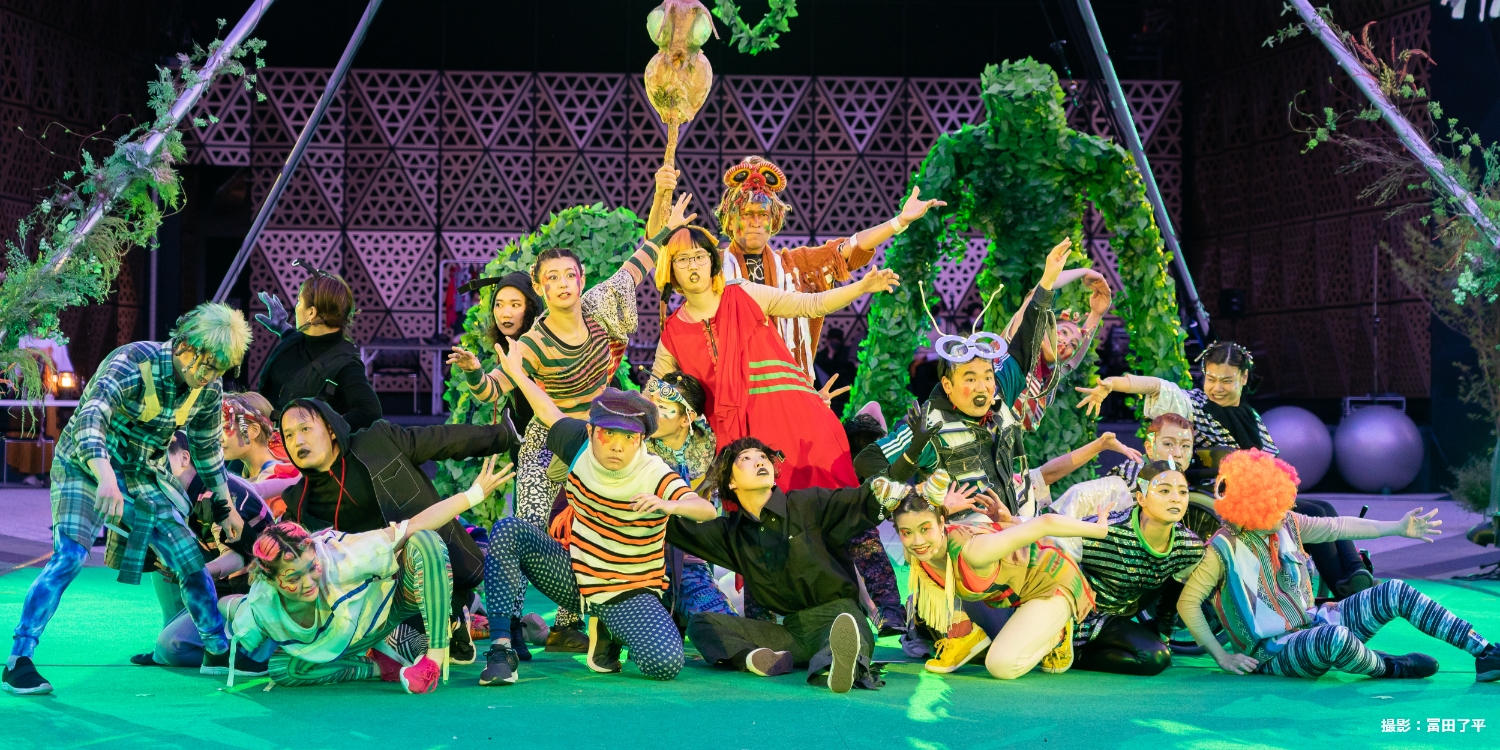
Hello everyone! I’m Yuki Sugimoto from Public Relations Dept. Division 3(Sports).
Here is the first installment of the SDGs series by the SDGs PR Strategy Team!
Please click here to read the first installment.
SDGs Series – Part 0: Changing the world with “Fun and Games”? Introducing the SUNNY SIDE UP GROUP’s social good activities!
The year 2021 is about to end. As “gold(金)” was recently chosen as this year’s Kanji (Chinese character), the biggest event of the year was probably the Tokyo 2020 Olympic and Paralympic Games. I am sure that many of you enjoyed cheering on the athletes, getting excited by the opening ceremony performances, and watching the games on TV at home.
How has our awareness changed after the Tokyo Olympics? In September this year, the Nippon Foundation conducted a “Survey on Awareness of Diversity and Inclusion.” Since the Nippon Foundation conducted the same survey in 2019, we compared the results of this year’s survey with those of two years ago to see how Japanese society and individual attitudes toward diversity have changed, and published the results in a news release.
With the growing interest in the SDGs and the momentum for social initiatives, we wondered how Japanese society and individual awareness of the SDGs were changing. In this issue, we would like to introduce some of the survey results.
Diversity & Inclusion refers to efforts to create a society in which diversity is respected and different values and abilities are included (embraced and utilized together), leading to innovation and new value creation, and in which each individual can play an active role and find his/her place(Hereinafter referred to as D&I).
■Awareness of D&I has increased from approximately 30% before the Tokyo Olympics to 40%

The percentage of respondents who are aware of the name “Diversity & Inclusion” raised up by 5.4 points from 66.5% two years ago to 71.9%. Furthermore, about 30%, or 29.9%, knew the meaning and definition of the term two years ago, compared to about 40%, or 39.4%, in this survey, an increase of 9.5 points. The survey showed that social awareness of D&I is spreading and understanding is becoming deeper.
■Prejudice and discrimination against social minorities decreased by 10 points after the Tokyo Olympics

When asked if there is prejudice or discrimination against social minorities, 85.9% of respondents answered “Yes, I think there is prejudice or discrimination,” still a high percentage, but a 10-point decrease compared to the 95.9% of respondents before the Tokyo Olympics!
However, even though we see a 10.4 point decrease for “LGBTQ (lesbian, gay, bisexual, transgender, and queer),” a 9.9 point decrease for “people with physical disabilities,” and an 11.1 point decrease for “people with mental, developmental, or intellectual disabilities”, on the other hand, there was no significant change for “foreign nationals living in Japan,” “people who do not look Japanese,” and “the elderly,” indicating that prejudice and discrimination against social minorities have not necessarily decreased…. This difference may be due to the increased exposure to people with disabilities during the Paralympics and increased awareness of LGBTQ.
*Social minorities in this survey include LGBTQ (lesbian, gay, bisexual, transgender, and queer/queer) people, people with physical disabilities, people with mental, developmental, and intellectual disabilities, people of foreign nationality living in Japan, mixed race and others who do not look Japanese in appearance, and the elderly (generally 75 years of age or older).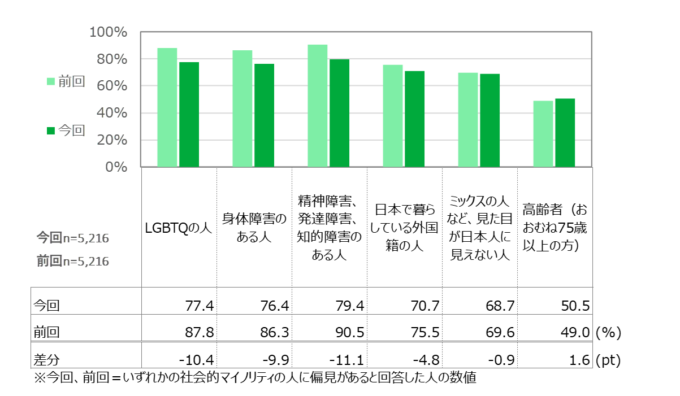
■About 60% of respondents in their teens say their awareness of D&I has increased, and about 30% of those in their 50s say their awareness of D&I has increased too
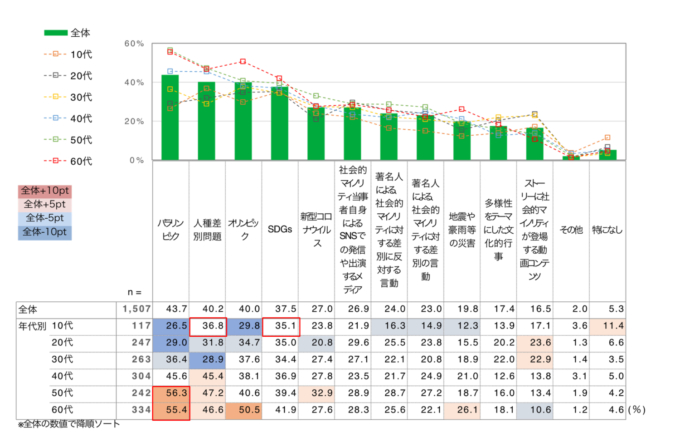

Awareness of D&I tended to be higher among those in their teens and 20s, and the most common reason for increased awareness of D&I was the exposure of the activities of people with disabilities through the Paralympics.
However, when examined by age group, respondents in their 50s and older were more likely to cite the “Paralympics” and “Olympics” as triggers for their increased awareness, while a higher percentage of teens cited “Black Lives Matter” and “SDGs” as triggers.
These differences in results by age group may be due to the media and schooling that they are exposed to every day, etc. It seems that understanding and promoting D&I will require the dissemination of information and messages that reach a wide range of generations.
By actually conducting a survey in this way, we can also reveal social conditions that have not been visible until now in the form of numbers.
By visualizing the “atmosphere of the times” that is difficult to verbalize through survey PR, a larger movement can be born. If you have a specific theme in mind but do not know how to promote it…, this is one of the PR methods you can consider.
In closing, the Nippon Foundation has the following to say about the results of this survey.
In order to promote awareness and understanding of D&I throughout society and to eliminate prejudice and discrimination against social minorities, it is necessary to take a longer-term approach that involves people of different ages and from different regions. Specifically, it will be important to create more contacts with social minorities in various ways and to enhance education on diversity and social minorities in school education.
In order to eliminate the awareness of prejudice and discrimination against social minorities, the Nippon Foundation is holding the True Colors Festival in 2019, an arts festival where people can enjoy the company of people with unique characteristics such as disabilities, gender, generation, language, and nationality through the performing arts. There are a variety of contents available, please check it out.
Official website: https://truecolorsfestival.com/
Click here to read an article introducing the True Colors Festival.
Super Diversity! What is a project that recognizes and enjoys every kind of individuality, including disabilities, gender, and nationality?







